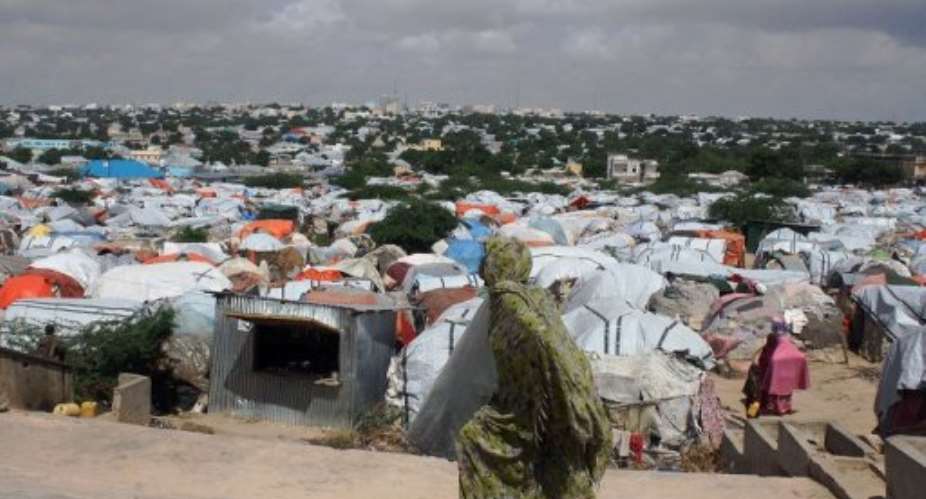Mogadishu (AFP) - Somali money transfer company Dahabshiil on Tuesday welcomed a temporary injunction by a British court allowing it to continue sending vital funds to the war-torn nation.
With no formal banking system, diaspora Somalis turn to money transfer services to support their families back home, sending some $1.3 billion (one billion euros) each year, according to aid agencies Oxfam and Adeso.
Barclays, the last major British bank still working with transfer companies, had said it would close all dealings with money transfer systems, cutting a $500 million yearly flow to Somalia.
The bank defended the move citing fears of money-laundering and the financing of terrorist activities.
But Dahabshiil challenged it in a London court.
"The court handed down its judgement, granting an interim injunction which has the effect of preserving Dahabshiil's banking arrangements with Barclays until the conclusion of a full trial," the company said in a statement.
In a first reaction a Barclays spokeswoman later said the bank was "very disappointed at today's decision, and we will be appealing.
"Barclays made a legitimate decision to exit these businesses based upon the well-known risks of money-laundering and terrorist financing in the money service business sector.
"The risk of financial crime is an important regulatory concern, and we take our responsibilities in relation to this very seriously."
Banks have been tightening rules in a bid to comply with international regulations against money laundering and funding terrorism, but experts said there were no known cases of regulatory breaches by Somali companies.
"We are not just a business.... We enable Somalis to help themselves, by sending money to every corner of the Somali territories to enable relatives and friends to buy food, medicine and to pay for education," the company added.
"Remittances are also used for investment in business start-ups and property. Remittances are helping Somalis get the country back onto its feet."
It was feared that closing organised transfers could drive them underground.
Somali Prime Minister Abdi Farah Shirdon welcomed the decision, while warning that a "permanent solution must be found to keep open this vital lifeline".
The best solutions would be to set up formal banking systems, experts say.
Somalis send money home via transfer businesses which can accept deposits abroad and immediately credit recipients.
But regulations require that transfer systems pass money through a bank account.
"As Somalia continues to recover from two decades of unrest these remittances remain an essential source of income for more than half of all Somalis," Shirdon added.
"To many these remittances pay for a basic standard of living, allowing families to put food on the table, clothe their family, treat illnesses and educate their children."
Charity groups have been campaigning to keep the transfer system afloat.
"The ruling provides a small window of opportunity for Somalis living in the UK to send money home to loved ones in one of the poorest countries in the world," Oxfam's Ben Phillips said.
"However, this does not solve the problem," he added. "A long-term fix is needed to safeguard hundreds of thousands of people relying on the money for food, medicines and education."





 April 20: Cedi sells at GHS13.63 to $1, GHS13.06 on BoG interbank
April 20: Cedi sells at GHS13.63 to $1, GHS13.06 on BoG interbank
 Dumsor: I'm very disappointed in you for messing up the energy sector — Kofi Asa...
Dumsor: I'm very disappointed in you for messing up the energy sector — Kofi Asa...
 Dumsor: Instruct ECG MD to issue timetable and fire him for lying — Kofi Asare t...
Dumsor: Instruct ECG MD to issue timetable and fire him for lying — Kofi Asare t...
 Ashanti region: Road Minister cuts sod for 24km Pakyi No.2 to Antoakrom road con...
Ashanti region: Road Minister cuts sod for 24km Pakyi No.2 to Antoakrom road con...
 Train crash: ‘How could any normal person leave a car on rail tracks?’ — Frankli...
Train crash: ‘How could any normal person leave a car on rail tracks?’ — Frankli...
 Train crash: Driver of abandoned vehicle not our branch chairman nor secretary —...
Train crash: Driver of abandoned vehicle not our branch chairman nor secretary —...
 Kenya pays military homage to army chief killed in copter crash
Kenya pays military homage to army chief killed in copter crash
 US agrees to pull troops from key drone host Niger: officials
US agrees to pull troops from key drone host Niger: officials
 Mahama vows to scrap teacher licensure exams, review Free SHS policy
Mahama vows to scrap teacher licensure exams, review Free SHS policy
 Government will replace burnt Madina shops with a new three-story, 120-store fac...
Government will replace burnt Madina shops with a new three-story, 120-store fac...
